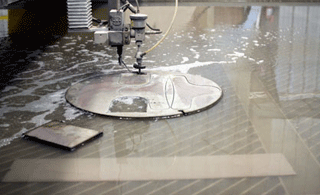The Ultimate Building Material

Metal is one of the most widely used building materials in the world. It is the preferred structural base of many projects because of the following characteristics:
The ability to cut and shape metal makes it an extremely versatile material. Skyscrapers are a prime example of what can be accomplished by using the strength and beauty of metal.
One of the most common forms of metal is plates. These plates are slabs of metal that can vary in thickness and offer differing levels of strength. The uses for these plates in their fabricated rectangular form are limited and much of the versatility is gained by cutting these plates into smaller shapes. This can involve small scale custom metal cutting or mass production for larger projects.
The thickness of these metal plates requires very powerful cutting machines to produce accurate and consistent cuts. In the case of mass production, thousands of cuts may be required with minimal variation tolerance allowed. Plasma cutters and waterjet cutters are two of the most commonly used machines because of their ability to cut metal powerfully and accurately.
Plasma Cutters
A plasma cutter is a machine that focuses a plasma torch onto a specific cutting area. A plasma torch is created by forcing inert gases out of a nozzle while an electrical arc is sent from the nozzle to the target. The extreme heat that results is more than enough to easily cut through most metal plate thicknesses (usually up to 6 inches thick) quickly and with near laser-like precision. This method is also known for producing clean edges after the cut is complete. Plasma cutters are one of the most affordable cutting technologies.
Plasma cutters can be automated and controlled by computer programs to further increase the accuracy and efficiency of cutting. Computer Numerical Controlled (CNC) plasma cutters are especially useful when many pieces are being cut with a focus on minimizing the variation tolerance. These cuts are usually so clean that they require no additional finishing.
Heavy duty plasma cutting equipment is required to handle large metal cutting requests. This usually involves a large cutting table and possibly overhead cranes to efficiently move the metal plates before and after cuts.
Waterjet Cutters
Waterjets take the naturally erosive properties of water and focus them into an extremely concentrated, high pressure stream that is powerful enough to cut through metals. Sometimes abrasives are added to the water in order to make the cutter more efficient. Waterjet cutters produce precision cuts and have minimal chances of overheating. They are also well served for cutting materials that can have their compositions changed when presented with severe heat.
Waterjet cutters are considered environmentally friendly because they use water instead of other potentially harmful chemicals or gases. The water and abrasives used for cutting can usually be recycled and used again. Most waterjets use less than a gallon of water per minute and the only type of gas resulting can be small amounts of steam. This results in a safer work environment for the people that are working in the exposed area. Waterjets tend to be a bit slower than plasma cutters, but they are generally more accurate for cuts and beveling.